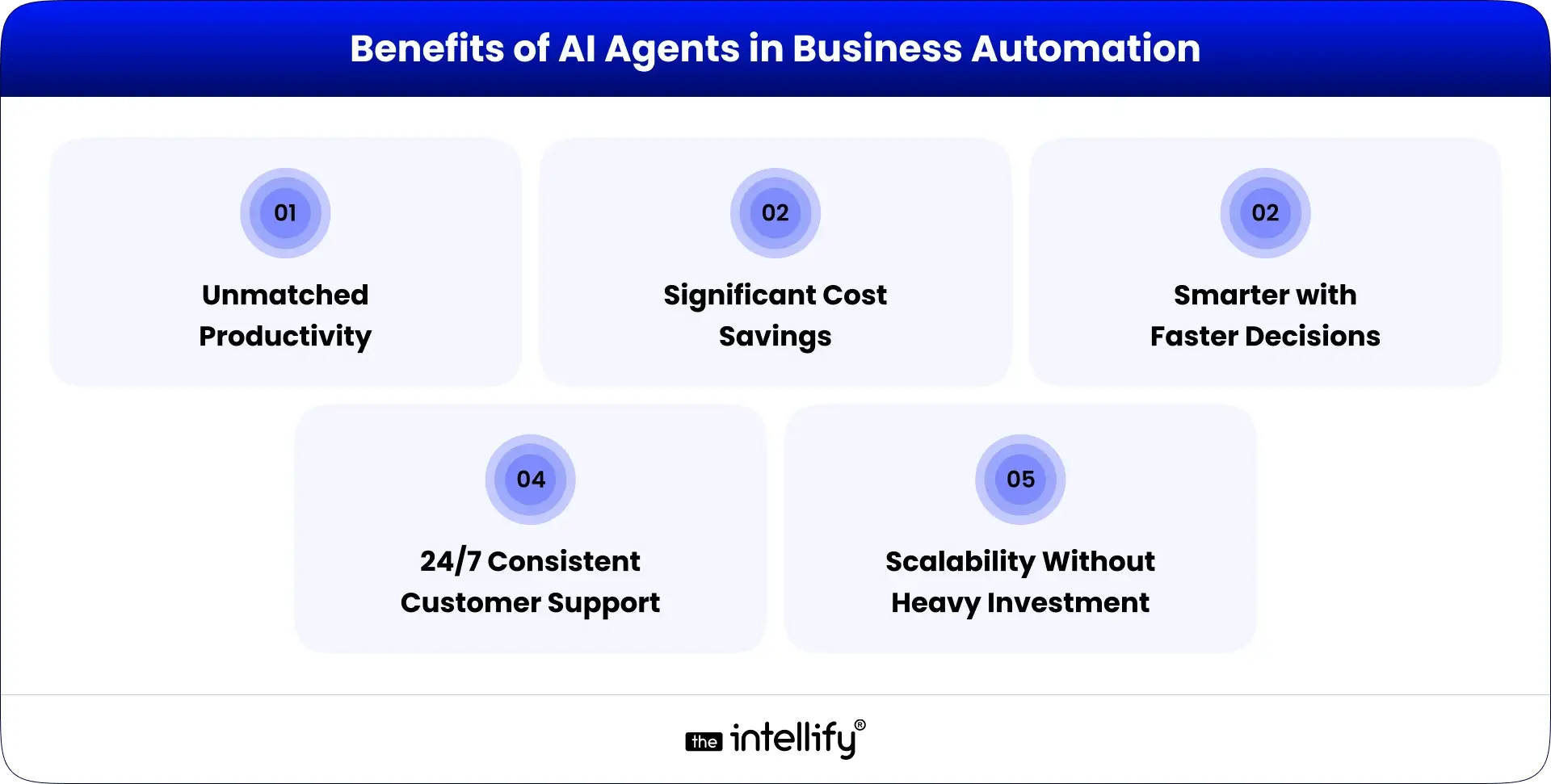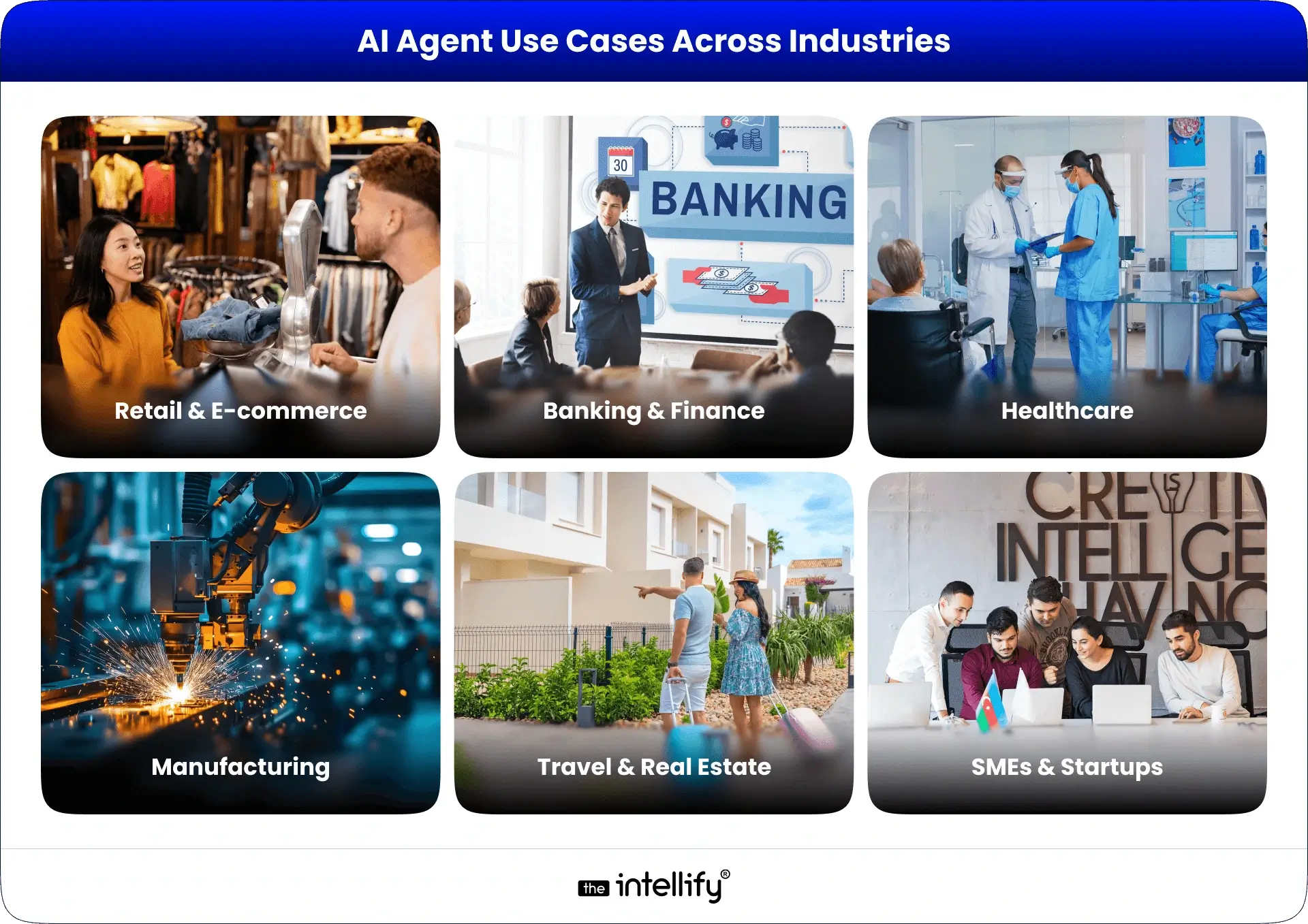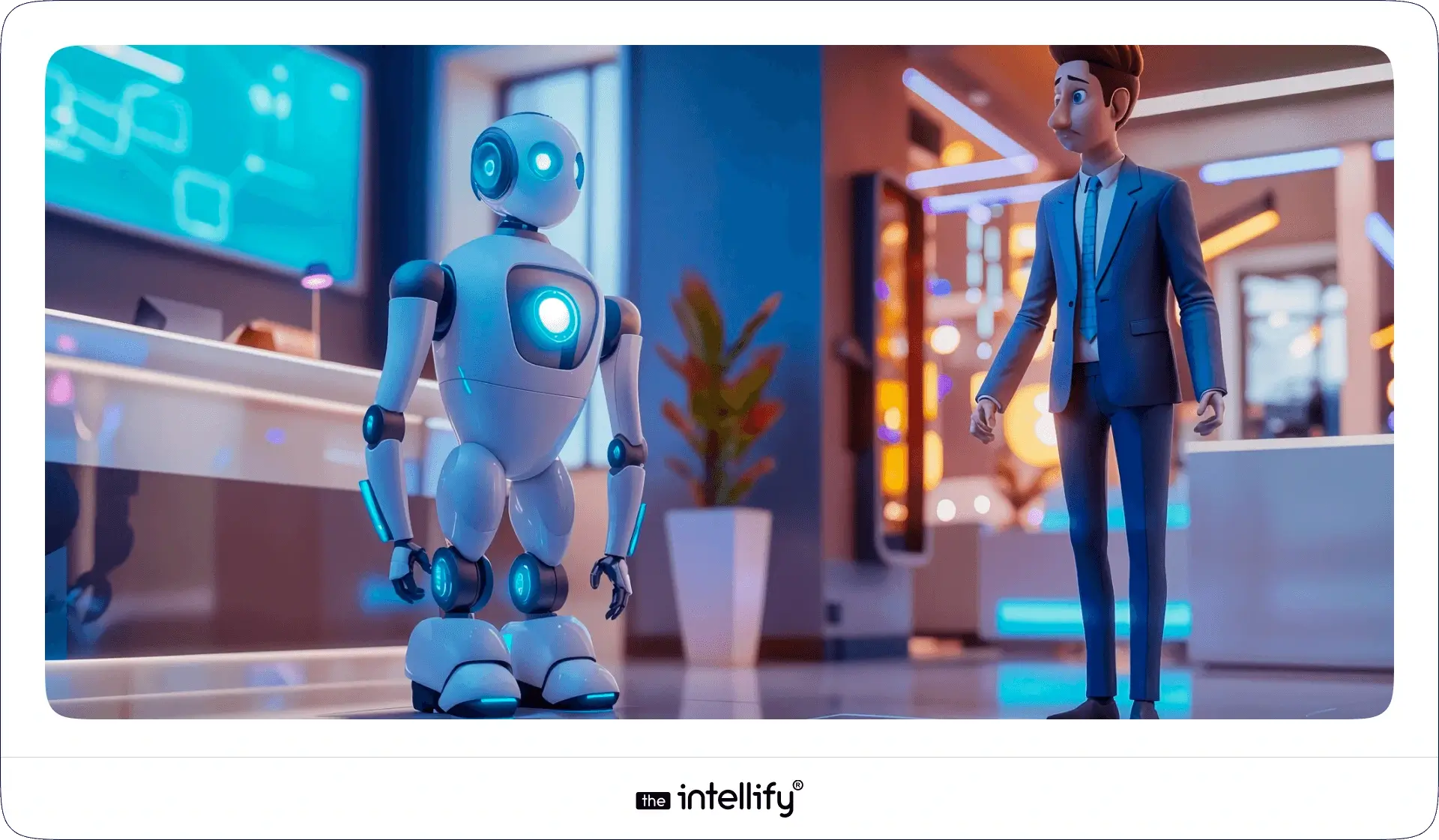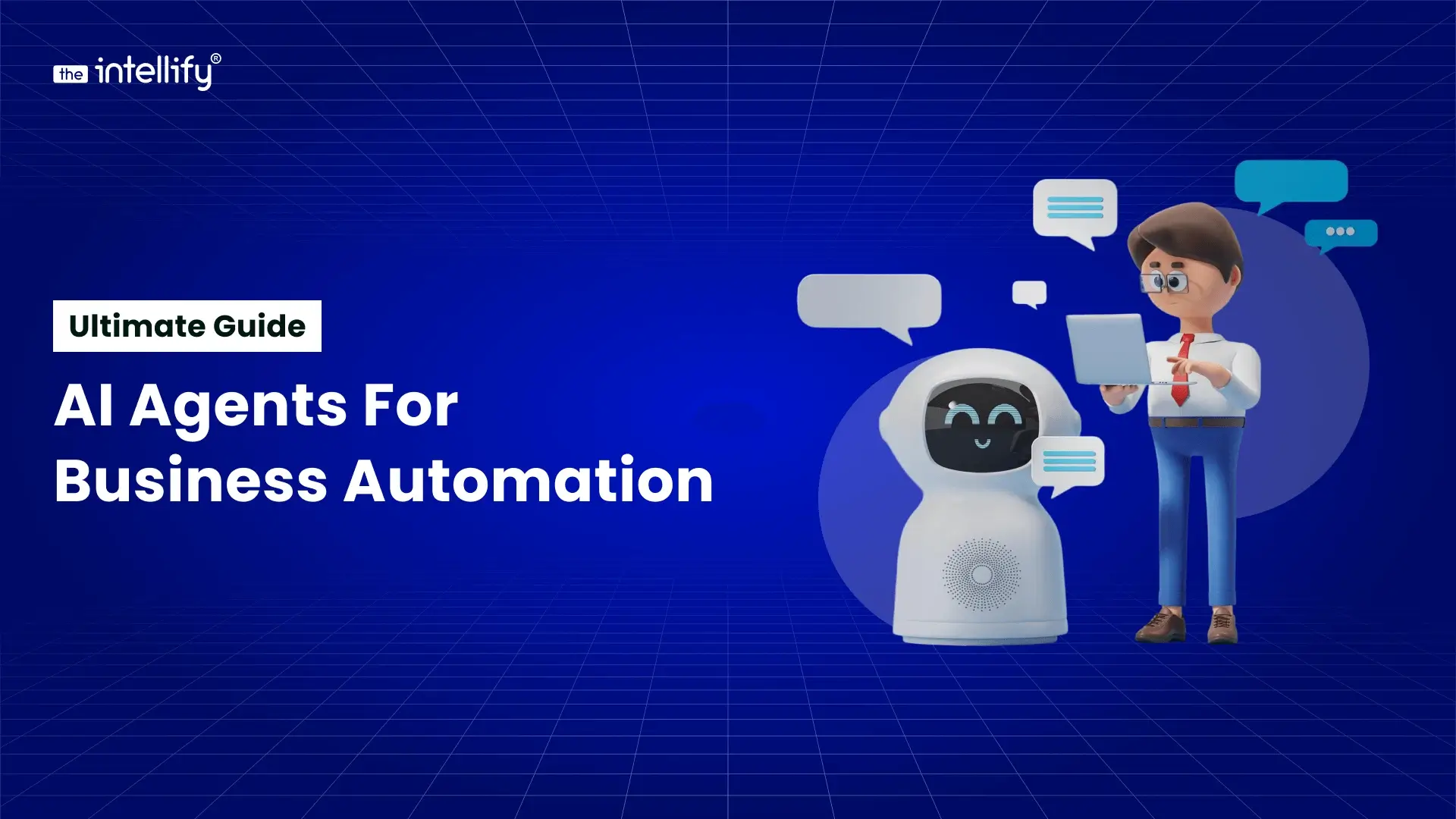Summary
In 2025, AI agents for business automation are changing the way companies operate. Unlike traditional automation tools, these smart agents can learn, make decisions, and act on their own, managing complex workflows across different industries. This blog highlights their key benefits, real-world applications, and practical tips for businesses to adopt AI agents successfully.
Why 2025 Is the Year of AI Agents
Business automation isn’t new. Companies have been automating processes for decades, starting with simple spreadsheets and macros, then moving to enterprise software and Robotic Process Automation (RPA). These tools helped save time, reduce human error, and cut costs.
But in 2025, AI agents are setting a new benchmark. They don’t just execute rules like bots; they learn, adapt, and make decisions independently. They are more flexible, more intelligent, and more human-like in their ability to understand context.
This shift comes at the right time. Businesses today face rising competition, unpredictable global markets, and demanding customers who expect personalized, instant experiences. AI agents are emerging as the digital workforce of the future, capable of scaling operations and driving growth in ways older automation tools simply cannot.
Understanding AI Agents in Business Automation

So, what exactly are AI agents, and how do they differ from the automation tools we already know?
An AI agent is a software program powered by artificial intelligence that can perceive, decide, and act independently within a business environment.
- Chatbots: handle customer queries through pre-defined responses.
- RPA bots: follow structured rules to automate repetitive workflows.
- AI agents: combine intelligence, decision-making, and learning to manage tasks across functions.
Unlike older tools, AI agents don’t require constant reprogramming. For instance:
- A chatbot may answer FAQs.
- An RPA bot may process invoices.
- But an AI agent can understand customer intent, resolve queries, process payments, flag anomalies, and improve performance over time.
In simple terms, AI agents are digital employees that can handle multitasking, work 24/7, and capable of learning just like a human colleague.
Why Businesses are Adopting AI Agents in 2025
So, what makes 2025 different from previous years of automation?
- Pressure to cut costs: Global inflation and rising labor costs make automation more attractive.
- Shift to digital-first operations: Businesses need scalable, 24/7 digital support systems.
- Smarter AI technology: With large language models (LLMs) and generative AI, AI agents now understand human language with near-human accuracy.
- Hybrid workforce models: As remote and global teams become the norm, AI agents act as digital co-pilots, coordinating workflows across borders.
By adopting AI agents, companies move from basic automation to intelligent automation, freeing employees from repetitive tasks and empowering them to focus on strategy, innovation, and customer experience.
Key Benefits of AI Agents in Business Automation

Adopting AI agents in business offers a wide range of benefits.
1. Unmatched Productivity
AI agents can process tasks in minutes that take humans hours. For instance, reconciling thousands of invoices, analyzing customer sentiment, or managing HR queries.
2. Significant Cost Savings
According to recent industry reports, businesses that use AI-powered automation cut operational costs by 20-40% compared to traditional methods.
3. Smarter with Faster Decisions
AI agents analyze structured and unstructured data to provide insights in real time. For example, a retail AI agent can suggest adjusting inventory based on current sales and seasonal demand.
4. 24/7 Consistent Customer Support
Whether it’s a customer in New York or Tokyo, AI agents ensure responses are instant, personalized, and consistent across time zones.
5. Scalability Without Heavy Investment
When demand spikes such as during holiday sales, AI agents can handle the surge without extra hiring or infrastructure. This makes them especially valuable for e-commerce, travel, and seasonal businesses.
Core Capabilities of AI Agents in 2025
What truly makes AI agents stand apart are their capabilities:
- Natural Language Understanding (NLU): Customers and employees can interact with agents in plain English (or any language), which eliminates language and technical barriers.
- Autonomous Decision-Making: For example, an AI finance agent can approve low-risk expense claims automatically while flagging anomalies.
- Multi-Tasking Across Workflows: Agents can manage HR onboarding, IT troubleshooting, and customer support at the same time.
- Self-Learning & Continuous Improvement: The more they work, the better they become, thanks to machine learning algorithms.
- System Integration: They connect with CRMs, ERPs, HRMS, ticketing tools, and analytics platforms without disrupting existing workflows.
These features make them dynamic partners in business growth.
AI Agent Use Cases Across Industries

Retail & E-commerce
- AI-powered shopping assistants guide customers through personalized journeys.
- Agents forecast demand and automate restocking.
- Customer support AI handles returns, refunds, and complaints instantly.
Banking & Finance
- Real-time fraud detection agents prevent billions in losses.
- AI wealth advisors recommend tailored investment plans.
- Regulatory compliance automation reduces human error in audits.
Healthcare
- AI agents in healthcare manage patient scheduling, follow-ups, and reminders.
- Virtual assistants provide 24/7 support for patients with chronic conditions.
- Research AI agents accelerate drug discovery by analyzing datasets faster than humans.
Manufacturing
- Predictive maintenance agents monitor equipment and reduce downtime.
- AI supply chain agents optimize vendor management and logistics.
- Quality control AI detects defects with higher accuracy than manual inspections.
Travel & Real Estate
- AI travel planners design personalized itineraries.
- Property AI agents conduct virtual tours and handle buyer queries.
- Agents assist with legal documentation in real estate transactions.
SMEs & Startups
- Virtual CFO agents track expenses and manage cash flow.
- Marketing AI agents run campaigns, analyze results, and optimize ad spend.
- HR agents automate hiring, onboarding, and payroll. Example: Alris AI
Across industries, AI agents are becoming must-have digital employees.
AI Agents vs Traditional Automation Tools
Here’s a simple comparison:
| Feature | Traditional Automation (RPA) | AI Agents |
|---|---|---|
| Approach | Rule-based | Intelligent & adaptive |
| Flexibility | Limited | High |
| Learning ability | None | Continuous Self-learning |
| Suitable for | Repetitive, structured tasks | Dynamic, complex workflows |
| Human role | High supervision required | Collaboration & co-creation |
Conclusion: RPA is good for rigid tasks. But AI agents are the future of automation.
Challenges in Adopting AI Agents
Like any technology, AI agents come with considerations.
1. Data Security & Privacy
Since AI agents process sensitive data, businesses must ensure robust encryption, compliance, and governance.
2. Risk of Over-Reliance
Over-dependence can be dangerous if agents make mistakes. Human oversight remains essential.
3. Workforce Resistance
Employees may fear replacement. Businesses need clear communication and reskilling programs to show AI agents are collaborators, not threats.
4. Ethical and Transparency Issues
If an AI agent denies a loan or makes a hiring recommendation, businesses must explain why. Transparency in decision-making builds trust.
5. Integration Complexity
Older systems may not be fully compatible with modern AI platforms. Choosing scalable, API-friendly solutions is key.
A responsible AI strategy includes clear policies, human oversight, and continuous monitoring.
The Future of AI Agents Beyond 2025

AI agents are just beginning their journey. Over the next decade, we can expect:
- Specialized AI Agents: Tailored for industries like law, real estate, or logistics.
- Collaboration First AI: AI agents will work side by side with humans, not as replacements but as co-workers.
- More Autonomy: AI agents will manage entire end-to-end workflows with minimal human input.
- Regulations and AI Governance: Governments worldwide will enforce guidelines on ethical AI usage.
- Mass Adoption Across Business Sizes: From startups to Fortune 500 companies, AI agents will become as standard as websites & mobile apps.
By 2030, AI agents may replace 30-40% of repetitive roles in enterprises, allowing humans to focus on innovation and strategy.
How Businesses Can Get Started with AI Agents
Here’s a practical roadmap:
1. Define Business Objectives: Identify tasks that are repetitive, costly, or time-consuming.
2. Select the Right AI Platform: Choose one that integrates easily with your ERP, CRM, and other tools.
3. Run a Pilot Program: Start small, measure outcomes, and fine-tune.
4. Measure ROI: Look at cost savings, error reduction, and customer satisfaction.
5. Scale Across Functions: Expand from one department (like HR) to finance, operations, and customer service.
6. Partner with Experts: Collaborate with an expert AI agent development company like The Intellify for tailored deployments.
Final Thought
In 2025, AI agents are no longer futuristic: they’re practical, affordable, and transformative. They are changing how businesses automate, scale, and operate. Companies that adopt AI agents today will lead their industries tomorrow. The key is to adopt responsibly, ensure transparency, and build a culture of human-AI collaboration.
If your organization is ready to explore AI-powered business automation, working with trusted experts like The Intellify can help you design and implement solutions that align perfectly with your business goals.
Frequently Asked Questions (FAQs)
1. What are AI agents for business automation?
AI agents for business automation are intelligent software solutions that can perform tasks independently, make informed decisions, and learn from experience. Unlike traditional automation, they handle complex workflows, analyze data in real time, and adapt to changing business needs. For businesses seeking guidance on implementing AI agents, The Intellify provides expert insights and tailored solutions for seamless adoption.
2. How do AI agents differ from traditional automation tools?
Traditional automation tools follow fixed rules and require human oversight for updates. AI agents, however, think, learn, and adapt. They can manage unstructured data, make decisions autonomously, and improve over time. This intelligence allows companies to automate more complex processes while maintaining flexibility. For businesses looking to modernize their workflows, The Intellify offers solutions that integrate AI agents effectively.
3. What are the key benefits of using AI agents in business?
AI agents deliver multiple advantages:
- Increased Productivity: Automate repetitive tasks and free human teams for strategic work.
- Cost Efficiency: Reduce operational costs by minimizing manual processes.
- Accuracy and Reliability: Lower human errors and ensure consistent results.
- 24/7 Operations: Maintain uninterrupted services across global time zones.
- Scalability: Handle larger workloads without additional resources.
4. Which industries can benefit most from AI agents?
AI agents are highly versatile and can optimize workflows across industries:
- Retail & E-commerce: Personalized shopping, inventory optimization, and automated customer support.
- Banking & Finance: Fraud detection, automated approvals, and compliance monitoring.
- Healthcare: Appointment scheduling, patient follow-ups, and data analytics.
- Manufacturing: Predictive maintenance, supply chain optimization, and quality control.
5. How can small and medium-sized businesses implement AI agents?
Small businesses can start by identifying repetitive or time-consuming tasks such as customer support, data entry, or inventory management. Partnering with experts like The Intellify ensures AI agents are tailored to their workflow, cost-effective, and seamlessly integrated without disrupting existing operations. This approach enables even smaller companies to compete with larger enterprises using intelligent automation.
6. Are AI agents secure for business operations?
Yes, AI agents are secure when deployed correctly. Businesses should ensure they comply with data privacy regulations, implement encryption, and undergo periodic security audits. With these safeguards, AI agents can handle sensitive business information while delivering efficiency and accuracy. The Intellify offers guidance to implement AI agents securely, ensuring businesses benefit from automation without risking data safety.



